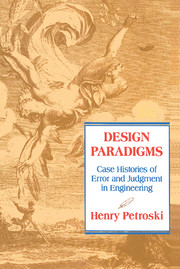Book contents
- Frontmatter
- Contents
- Preface
- 1 Introduction
- 2 Paconius and the Pedestal for Apollo
- 3 Vitruvius's Auger and Galileo's Bones: Paradigms of Limits to Size in Design
- 4 Galileo and the Marble Column
- 5 Galileo's Confirmation of a False Hypothesis
- 6 The Design and Collapse of the Dee Bridge
- 7 The Britannia Tubular Bridge
- 8 Failure as a Source of Engineering Judgment
- 9 The Design Climate for the Tacoma Narrows Bridge
- 10 Historic Bridge Failures and Caveats for Future Designs
- 11 Conclusion
- Bibliography
- Index
3 - Vitruvius's Auger and Galileo's Bones: Paradigms of Limits to Size in Design
Published online by Cambridge University Press: 05 June 2012
- Frontmatter
- Contents
- Preface
- 1 Introduction
- 2 Paconius and the Pedestal for Apollo
- 3 Vitruvius's Auger and Galileo's Bones: Paradigms of Limits to Size in Design
- 4 Galileo and the Marble Column
- 5 Galileo's Confirmation of a False Hypothesis
- 6 The Design and Collapse of the Dee Bridge
- 7 The Britannia Tubular Bridge
- 8 Failure as a Source of Engineering Judgment
- 9 The Design Climate for the Tacoma Narrows Bridge
- 10 Historic Bridge Failures and Caveats for Future Designs
- 11 Conclusion
- Bibliography
- Index
Summary
Perhaps no principle in design is so well known and yet so frequently forgotten as the effect of size or scale on performance. Although some of civilization's most proud moments have been immortalized in colossal monuments to the triumph of human design ingenuity over the great forces of nature, some of history's most embarrassing moments have come in the dramatic failures of some of the largest machines, structures, and systems ever attempted. Nowhere does the line between success and failure seem so thin as when the very greatest of our human efforts straddle it.
Some of the earliest recorded thought about design shows an awareness of a scale effect in natural and fabricated things. Among the minor works of Aristotle is a collection of questions and answers known as Mechanical Problems, in which queries about the physical world are posed and solutions offered in the context of fourth-century B.C.E. knowledge of physics, mathematics, and engineering. Although there is some doubt that Mechanical Problems is actually the work of Aristotle himself, rather than of his Peripatetic School, certainly the work fairly represents contemporary thinking and shows that engineers of twenty-four centuries ago wrestled with problems that can still be troublesome today, as indicated by recurring design errors and structural failures. Among the thirty-five mechanical problems posed in Aristotle's time were “Why [are] larger balances … more accurate than smaller ones?”
- Type
- Chapter
- Information
- Design ParadigmsCase Histories of Error and Judgment in Engineering, pp. 29 - 46Publisher: Cambridge University PressPrint publication year: 1994



